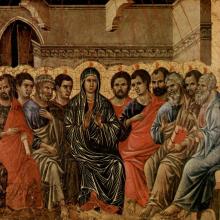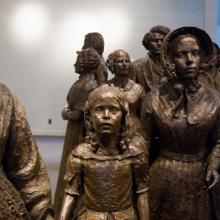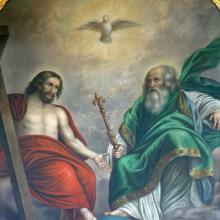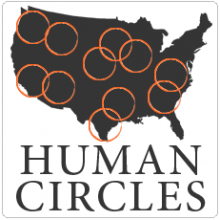Pentecost
Pentecost celebrates the giving of the Holy Spirit and reminds us that our story isn’t static but dynamic, alive, and unfolding. In the same way that the disciples moved out from Jerusalem after Pentecost, we are to move out of our places of comfort and complacency as we join God in the world he is making.
THE CHILDHOOD UNDERSTANDING of the familiar tune about climbing Jacob’s ladder needs a reset. The Genesis narratives aren’t just about heaven—they yield epiphanies into the ordinary life of faith. The household of Abraham and Sarah, even in its ancient context, is atypical. In family dynamics, without the miraculous moments, epiphanies subvert our expectations of whom and what God can utilize to reveal the faithfulness of divine promises. Sometimes the testimony is evident in ordinary lives—even ours. You’ve heard it said, “Our greatest weakness is our strength.” The episodes in Jacob’s life provide sufficient demonstrations of how passions both energize and blind us: Passion or anger; leadership or arrogance; emotion or intuition; determination or stubbornness.
Despite Jacob’s inconsistencies, the second half of Genesis encompasses his story, as the son of Isaac, grandson of Abraham. Here we find an unfolding drama. Characters display human nature at its extremes: conniving relatives, loving couples; creative entrepreneurs, dishonest contractors. All, somehow, used by God to form a people with whom the Spirit so evidently abides.
Even when we go our own way, God’s purposes are not thwarted. The challenge for the church in this Pentecost season is to trust that God is planting seeds in good soil—and the seeds that won’t sprout also have a purpose in this garden. Remember that the actions of justice, grace, and faithfulness we practice at home are as much a witness to God as our public proclamations and protests.
Can you imagine sitting in a public space and all of a sudden everyone around you starts to speak in a different language? And yet somehow you still understand them? Can you imagine the cacophony of sounds this event would cause? Can you envision the power it would take to make this astonishing moment happen?
Is it a miracle? Possession? Paranormal activity? It likely would freak you out.
This moment actually happens more often than we think. A glimpse of this cacophony of sounds can be found in our everyday lives. We hear loud voices coming through network and cable news shows, on Twitter and Facebook, and through other social media outlets. We hear rising decibels of chatter around social justice issues — from the right and from the left — about issues as diverse as abortion, same-sex marriage, income inequality, biblical obedience, or defining traditional values. We hear the noise. At times, it is almost deafening. The voices seem to fly past each other so fast that neither side seems to be listening to the other at all.
But then there are moments when we all come together to speak for one common purpose.
EVER SINCE ADAM AND EVE ate themselves out of house and home, we’ve experienced a brokenness in our lives. Rather than offer praise for God’s wondrous acts, we attempt to build God’s kingdom ourselves. Rather than tell of God’s greatness, we whine that religious obligation demands too much. Rather than involve ourselves in the community, we divide into factions over whether we should work or pray, wait or proceed. Still trying to be more god-like than accepting the assignment to bear God’s image in the world, we attempt to make a name for ourselves. The result? Human-initiated plans cast in language that parodies God’s own plan, pitting human counsel against divine. Setting nation against nation.
Pentecost marks a special occasion in the life of the Christian community. This extraordinary record of what we call the “birthday of the church” is less often noted as the 50th day after Passover—a day to pause, gather, and remember the great acts of God. Passover marks the liberation of the enslaved children of Israel from Egyptian oppression, and Pentecost is the moment “the Holy Spirit is poured out by God ... to empower the church to advance Christ’s mission to the very ends of the earth,” as David P. Gushee puts it.
The Pentecost mission involves patience with God’s timing, which is submission to God’s will. Meanwhile, rather than looking up for Christ’s return, we look for opportunities to be evidence that the kingdom has come.
The women were there at the foot of Jesus’ cross.
The women were there when they laid him in the tomb.
The women walked through the desolate graveyard in the darkest hours of the night — the hours just before dawn, carrying sweet spices prepared to anoint Jesus’ dead body for proper burial. But they never got the chance.
They witnessed the earthquake, talked to the angel, and ran to the other followers announcing the resurrection of their beloved.
And Jesus’ mother, Mary, huddled in the upper room praying with the other women and the rest of the disciples in the days following the resurrection. Until that day, 50 days later, when tongues of fire fell on them all and Peter reminded the crowd of Joel’s ancient prophecy: “Your sons and daughters will prophesy.”
From the cross to the upper room, the women are lifted up! As the church stands in the light of Easter Sunday and now sets its face toward Pentecost, let us remember the women. And, as we do, let’s also remember the women in our pews and surrounding communities — the challenges, fears, and the very real dangers women face every day.
AS THE SEAONS after Pentecost unfolds, we might think that summer calls for a kind of “church lite” in which we shouldn’t expect much to happen. With the dramatic commemorations behind us, the scriptures seem miscellaneous. But this season has its own purpose of soaking in the Word. Just let go of dependence on drama.
Our month’s reading opens in 2 Kings 5 with the healing of Naaman, the distinguished Aramean general, told with a dry humor that Jesus appreciated, since he specifically mentions it (Luke 4:27) in his teaching about faith found outside the bounds of Israel. At first Naaman’s dignity is offended by Elisha not bothering even to meet him in person. His pride receives a further blow in the ludicrous banality of the prescription that Elisha’s assistant passes on: “Go, and wash in the Jordan seven times” (verse 10). Naaman’s fuming about the short shrift he got, and the humiliation of being prescribed a business of splashing in a local stream, are quite comic. Paddling in the Jordan indeed—a ditch in comparison to the storied rivers of Damascus! Smiling, we recognize the storyteller’s shrewd knowledge of psychology. The tale has a good ending. Finally getting off his high horse, Naaman allows his aide to persuade him to try the simple bathing routine. Over time his skin is healed and rejuvenated.
The church behaves like that shrewd aide when it invites us to trust in the power of hearing the scriptures again and again, however overfamiliar some of them seem, and others obscure.
You may not realize this, but senior pastors throughout the world were on vacation last Sunday. Not because they were celebrating the American holiday weekend of Memorial Day. No, senior pastors the world over were conveniently on vacation because it was Trinity Sunday.
Of course, I can’t blame pastors for taking a nice weekend vacation and leaving the challenge of preaching the Trinity Sunday sermon to their associates. I’ve always had a hard time with the Trinity — not because of the math. I was always horrible at math. I frequently tell people I became a pastor and a blogger because I failed Algebra. So, the concept that 1 + 1 + 1 = 1 has never been an issue for me.
While the consequences of social privilege are alarming for numerous reasons, we are reminded that such systematic inequalities are by no means unique to the current day and age. For example, during Jesus’ ministry he encountered a predominant culture that distributed a wide variety of elite benefits based upon gender, class, ethnicity, and other forms of false favoritism. However, one of the primary distinctions of Jesus’ life, which he continually modeled for his disciples, was a prophetic confrontation with unjust structures of social privilege.
As Jesus accompanied women, tax collectors, lepers, prostitutes, and others firmly placed on the underprivileged margins of society, he repeatedly sought the reversal of embedded discrimination and disadvantage. In doing so, not only did Jesus promote Good News of eternal life for after death, but he sought to “let the oppressed go free” (Luke 4:18) for the fullness of life after birth.
While Jesus continually endorsed the revolution of unjust social privilege, and although he taught his followers to do likewise in his name, the harsh reality is that privilege based on prejudice is profitable, which makes it difficult – if not impossible – for those in power to surrender voluntarily
All were amazed and perplexed, saying to one another, ‘What does this mean?’
Acts 2.12 (NRSV)
Charles Ramsey, the African American male dishwasher who rescued Amanda Berry from captivity preached a transforming sermon when he shared his story about how he helped a Euro American woman in distress escape from 10-years of captivity. Ramsey boldly told the local television news reporter in Cleveland, “Bro, I knew something was wrong when a little pretty white girl ran into a black man’s arms.” And later when CNN’s Anderson Cooper asked Ramsey, how he felt about being a hero, Ramsey said, “No, no, no. Bro, I’m a Christian, an American. I am just like you. We bleed the same blood …”
Ramsey’s blunt honesty which spoke to the existence of racism and his sincere compassion for humanity was a 21st century mystification; a “radical real lived” theological symbol for the reason, why Christians celebrate Pentecost – the birth of the Holy Spirit and the historic beginning of the Christian Church. Biblical scholars teach us on the Day of Pentecost that a strong wind swept through a house where Jesus’ followers gathered days after he was resurrected from the dead. It was in the city of Jerusalem, where Jewish pilgrims gathered to celebrate Shavuot and people from other cultures who spoke diverse languages — believers and non believers of Jesus, heard about God’s powerful works in their native tongues and felt God’s holy presence.
When the day of Pentecost came, they were all together in one place. And suddenly from heaven there came a sound like the rush of a violent wind, and it filled the entire house where they were sitting. Divided tongues, as of fire, appeared among them, and a tongue rested on each of them. All of them were filled with the Holy Spirit and began to speak in other languages, as the Sprit gave them ability.
Consider in the past year alone, America has wrestled over the injustice of forced vaginal probe ultrasounds. We have had our own deep cultural apathy revealed as the media tipped their sympathies toward the jocks that ripped a 16 year-old girl’s life and body through gang rape in Steubenville, Ohio – even as our nation gasped in horror at multiple reports of gang rapes of women in India. And over the past few weeks we have witnessed the unmasking of several U.S. military leaders, who were charged with duties to protect the women in their ranks, as they were revealed to be the very perpetrators themselves.
In Jim Wallis’ latest column, he writes, “It’s time for all people of faith to be outraged” and adds, “And it's time for us in the faith community to acknowledge our complicity in a culture that too often not only remains silent, but also can propagate a false theology of power and dominance.”
Will we do it? Will we take the step? Will we allow this holy wind that has blown the cover off of evil deeds done in the dark to rush through? Will we allow the cleansing waters of God to wash our society clean of practices — both private and public — that twist, maim and crush the image of God in more than half its population? Will we exercise the same courage that it took for those women at the first Pentecost to allow the spirit to move them into the public square and speak — testify, tell the truth, and prophesy? Will we repent from our silence?
Repentance begins in the heart. So, I must ask: “Will I repent of my silence — my safe silence?” Yes.
THE SAGA OF Elijah that we are following in 1 and 2 Kings culminates in a poignant parting as the prophet prepares to be taken up into heaven. His disciple, Elisha, makes a final all-or-nothing request: “Please let me inherit a double share of your spirit” (2 Kings 2:9). Elijah states a condition for the fulfillment of Elisha’s prayer: “You have asked a hard thing; yet, if you see me as I am being taken from you, it will be granted you; if not, it will not” (2:10). It is as if Elisha has to look unblinkingly into the reality of their separation. If he is to inherit the prophetic mantle and spirit of his teacher, he must claim the vocation in its entirety. He is now to be the prophet.
The story is an uncanny pointer to the truth that John the Evangelist highlights in Jesus’ last words to his disciples: “I tell you the truth: It is to your advantage that I go away, for if I do not go away, the Advocate will not come to you ...” (16:7). John even echoes the “double spirit” theme in 14:12, when he has Jesus assure us that our prophetic endeavors will be more abundant and powerful than Jesus’ own!
The season following Pentecost helps us realize that we are the prophets now, vested with the mandate and endowed with the gifts for enacting the good news of liberation.
We tend to consider the crucifixion, the resurrection, and Pentecost in two ways primarily. We see them as history, stories about things that happened a long time ago. Or we consider them through theologies about what they mean for us after we die.
Yet, there is a deeper reality to all of them. The cross, the empty tomb, the moment of divine inspiration are repeated every day and everywhere. They’re ongoing and participatory.
Many experience those moments of inspiration each day. They’re moved to help someone who is hurting, inspired to care for those who are struggling, emboldened to try to change their world in some way. They sense something divine in the small moments of life. They stand up for anyone who is being treated as less than an equal child of God. They see love at work all around them.
Spirit-filled moments happen every day.
I WAS BROUGHT UP up on stories of my family's emigration to Russia from England in the 1850s and of the three generations we lived there and intermarried. My grandparents fled the upheavals of revolution in 1917, returning to England. Having drunk deeply from the springs of Russian spirituality, it is second nature to me to hear the scriptures with Russian ears. As Eastertide culminates at Pentecost (rounded out in the wonderful coda of Trinity Sunday), I find myself murmuring as a mantra the great injunction of St. Sergius of Radonezh, "Beholding the unity of Holy Trinity, to overcome the hateful disunity of this world!" The doctrine of the Trinity is no mere antiquity, but a beacon pointing to the future that God desires for the world. In the Trinity, "hateful disunity" can be transformed into life-in-communion; our life together as human beings incarnating our identity as ones made into the image and likeness of God. I will find myself doodling on my notepad the provocative claim of the Russian lay theologian Nikolai Fedorov: "Our social program is the dogma of the Trinity."
Taking in again the Trinitarian grammar of our prayer and faith, I will find myself reinvigorated for the task of forging a spirituality that, as a great Anglican priest Alan Ecclestone wrote, "takes its Trinitarian imagery more seriously than ever before, relating the creativity, the humanizing, and the unification of [humankind] in one growing experience of mutual love." This from a man who was a passionate political activist writing from the thick of gritty urban politics, not from an ivory tower.
Holy Trinity is not the most popular festival among preachers who, for all the other seasons and special days of the church year, normally get to dig into interesting gospel narratives.
Most other festivals of the church celebrate an event. We commemorate happenings in the life of Christ: Mary’s visit from Gabriel announcing the miraculous child she was to bear into the world, God’s own word made flesh. We celebrate also the light bearing nature of your own patronal season of Epiphany, we celebrate the messy Baptism of our Lord, the confusing Transfiguration, and Jesus riding triumphant into Jerusalem amidst palms and cheers. We celebrate the empty tomb of Easter, the glorious Ascension, the chaotic coming of God’s spirit to the church at Pentecost all leading up to today, when we celebrate … a church doctrine.
Preachers dread this day because we see it as kind of a dry dusty theological topic after such the exciting and earthy part of the liturgical year that came before it. It’s like there’s this raucous party of Easter and Pentecost that comes to a screeching halt while an old crotchety man shuffles up to the pulpit, blows the dust off an enormous leather-bound book, clears his throat saying And now a celebration of church doctrine causing the music to fade, the last of the Pentecost streamers still floating to the ground. Church doctrine Sunday.
A dear friend recently reminded me of David Ford’s gem of a book, The Shape of Living: Spiritual Directions for Everyday Life. On the back cover, Nicholas Wolterstorff describes it beautifully: “[This book's] spirituality is profound and reflective, yet always concrete, and never dishonest or evasive; it uses not only Scripture but literature with creative facility. Simple, yet rich. A jewel of the spiritual life in its everyday manifestations. I want to savor it with repeated readings.”
Ford traces the “multiple overwhelmings” in our lives — the forces that shake us and shape us, those with the power to wound or crush and those that are life-giving and transformative. At stake in reckoning with such tumult is the whole of our lives and our living. “How,” he asks, ”in the midst of all our overwhelmings, are our lives shaped?”

Pentecost depiction by Duccio di Buoninsegna via http://bit.ly/w3Q6IA
For those who re-discover their faith by taking seriously the vision offered in the second chapter of the book of Acts, the Occupy movement may appear to them as the New Pentecost. Note the similarities between the ancient story and the contemporary movement:
- In Acts, the emergence of new power occurred when the “gossip” about the Resurrection became a life-empowering message that transcended all lingual differences: “each heard in his own language.” Likewise in Occupy Wall Street: in the development of a new means of communication, people of diverse backgrounds both spoke and heard in a common language. It was, indeed, a New Pentecost.
Unlike the earlier turn-of-the-20th-century Pentecostal movement, which created a plethora of new denominations, the Charismatic Movement — with its emphasis on the felt-presence of the Holy Spirit, intimate worship, healings, and spiritual gifts as written about in the New Testament — united Lutherans and Catholics, East Orthodox and Episcopalians, promising in its early years to utterly remake ecumenical dialogues into a fully-felt move of the Spirit.
These heady early days inspired everyone from the Jesus Movement to Richard Rohr and many believed that a new fullness of Christian faith was being formed.
Then, as often happens as new movements grow and spread, things got messy. Denominational officials became suspicious; new denominations like the Vineyard were born, attracting new Christians such as Bob Dylan.
The New York City Human Circle will be replicated throughout across the nation, when faith leaders host Human Circles as members of the Sojourners National Mobilizing Circle, which is bringing together faith and community leaders to organize faith-rooted actions in their communities.
The purpose of these circles is not only to lobby for the poor but also with them.
The atlas also documents other dramatic trends, including the fragmentation of Christianity. New denominations, often borne out of strife and division, multiply endlessly. In Korea, for instance, there are now 69 different Presbyterian denominations. At the rate we are going, by 2025 there will be 55,000 separate denominations in the world!
That is an utter mess fueled by rivalry and confusion that hampers the church's witness and makes a mockery of God's call to live as parts of one body.
The atlas also documents the dramatic rise of revival movements throughout the world, and charts the story of Pentecostalism's rise. From its beginning a century ago, Pentecostalism now comprises a quarter of all Christians in the world. This fundamental change in Christianity's global composition, along with its geographical transformation, has created a dramatically different Christian footprint in the world.
My favorite characters in The Lord of the Rings are the Ents -- an ancient race of giant living, talking, breathing trees in J.R.R. Tolkien's fictional land, Middle Earth. I have a little confession to make: Whenever I hear a reading from Isaiah 55 where it says, "The mountains and hills before you shall burst into song and all the trees of the field shall clap their hands," I always picture the Giant Ents from The Lord of the Rings. And then I picture these clapping trees from Isaiah holding little Hobbits in their branch arms in what ends up a willful conflation of Middle Earth and Major Prophet.















